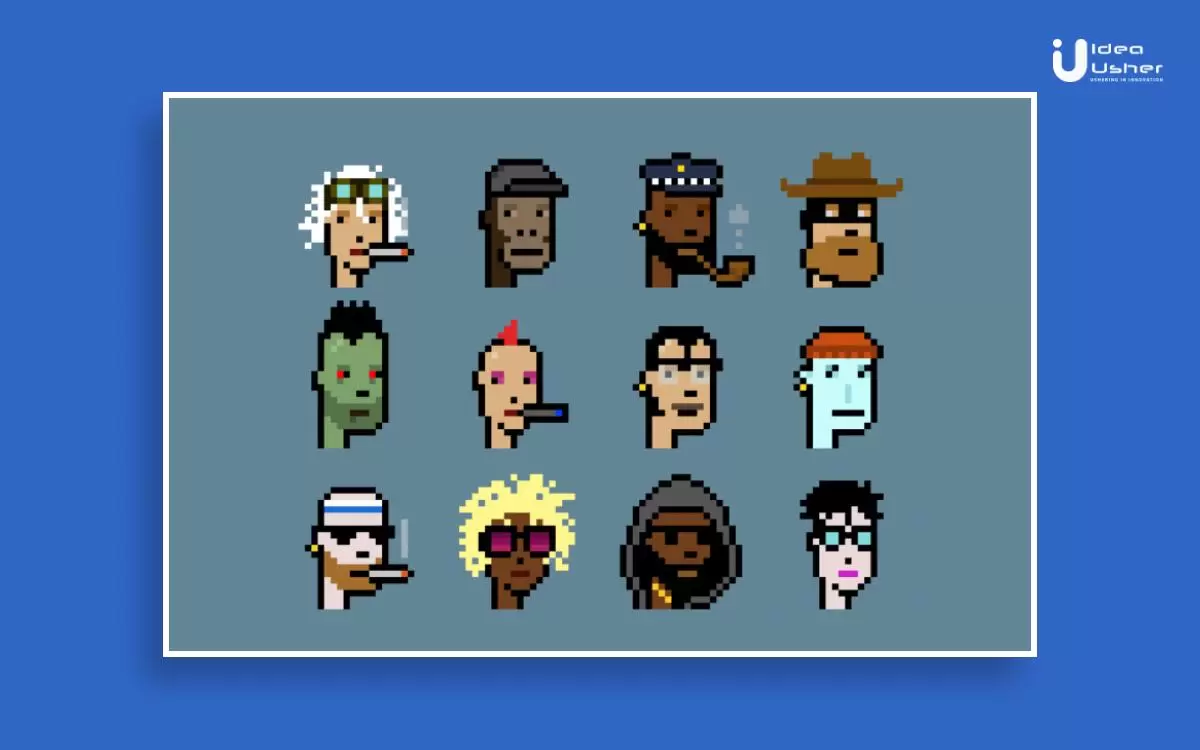
According to Statista, the market size of NFTs has grown from $40.96 M to $338.04M between 2018 to 2020.
The rising trend of using blockchain technology encourages many businesses to create their NFT marketplace architecture to profit from both non fungible token creators and buyers.
It is an excellent opportunity for anyone who wants to create their NFT marketplace and maximize profits. However, many of us don’t know how to create a trading platform where users can trade digital assets.
You can understand in detail by knowing all the steps and requirements to create your digital asset trading platform.
What is an NFT Marketplace?
It is a virtual shopping center that offers collections of tokenized assets such as digital arts, music, gaming, characters, and much more. The nonfungible token trading platform allows creators to sell collections to buyers.
The currency required for buying collections on a specific platform will depend on the blockchain network on which the trading platform has been developed. To purchase digital assets, users must have their crypto wallets where they can buy and store these tokens.
Reasons behind the boom of NFTs
Many brands and celebrities launch their collection by making announcements on their Twitter accounts. There is a big involvement of their fans and customers looking to buy collections.
Here are the top reasons why non fungible tokens are so popular nowadays:
1. Passion for collectibles
Multiple digital collections, such as FIFA Ultimate team digital cards, Fortnite skins, or Pokémon, use blockchain technology to tokenize their digital assets to protect their ownership of specific collections.
Individuals passionate about keeping such collectibles are now moving toward different non-fungible stores to buy their favorite collections.
2. Easy to store
Blockchain technology has entirely changed how people keep their collectibles. With the help of crypto wallets, users can store their favorite collectibles, digital arts, music, gaming characters, and other things.
Storing collections on a blockchain platform is safer and more secure than traditional asset-storing methods.
Also, many businesses use blockchain technology to store their private and personal documents safely.
3. Investment opportunities
Not everyone is passionate about keeping collectibles in their crypto wallets. Many investors have created their accounts on the trading platform to purchase non fungible tokens for investments.
Also, many artists want to make extreme profits by launching their NFTs to specific marketplaces. Here are some best NFT business ideas.
Solana is the most preferred blockchain platform to sell NFTs due to its less mining fee and fast speed. Check the top Solana NFT marketplaces.
4. Development opportunities for startups
There are multiple profitable marketplaces available in the market. The revenue of all these trading platforms encourages entrepreneurs to create their own.
Here are some profitable non-fungible token-buying platforms you must check:
I. NBA Top Shot
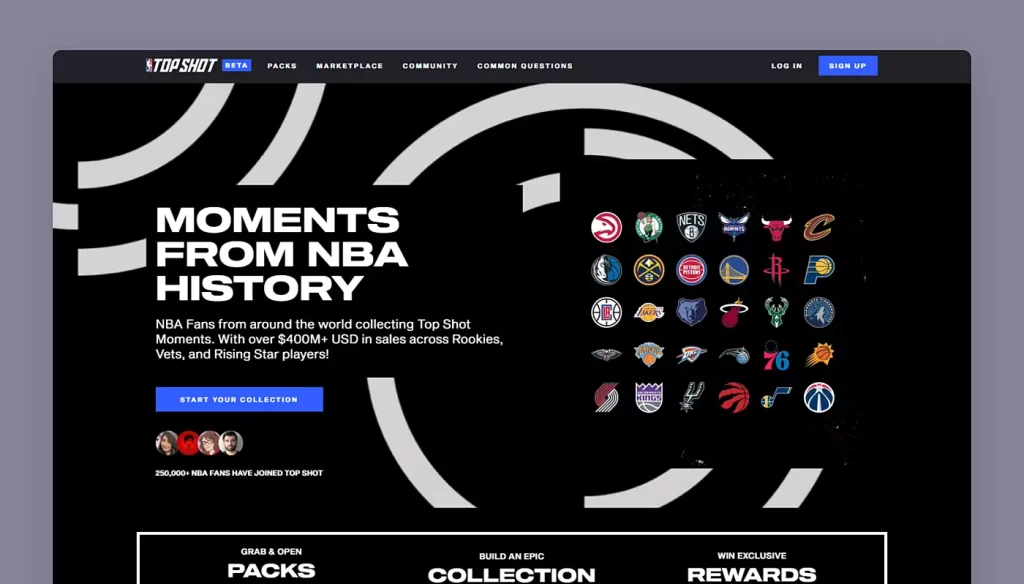
The Vancouver-based blockchain company Dapper Labs launched NBA Top Shot in February 2021. The platform is an NFT virtual shopping center offering the best digital basketball highlights to buy digital packs with random moments.
| Users | 128.15K |
| Volume | $44.58M |
| Transactions | 1.40M |
| Balance | NA |
II. OpenSea
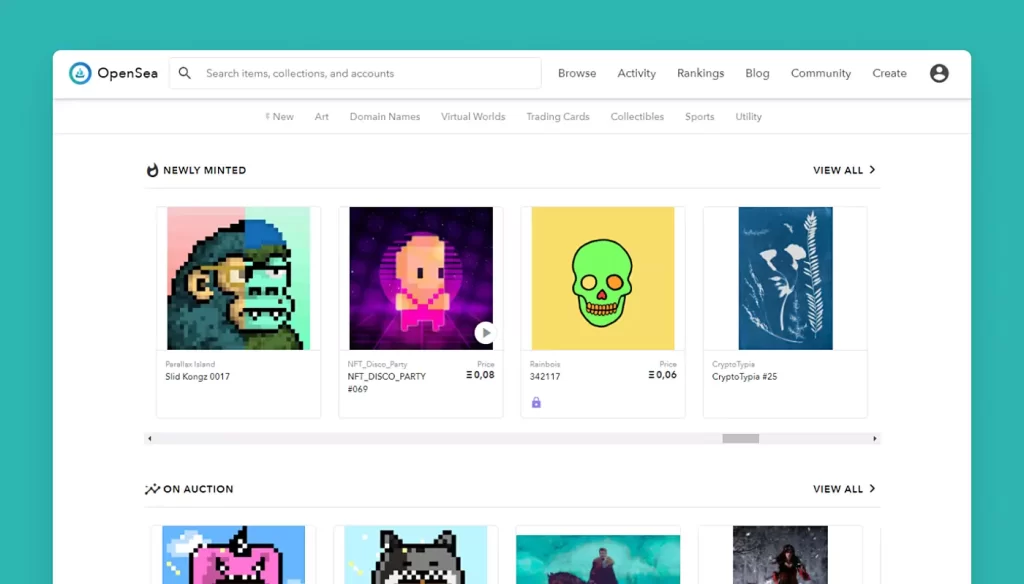
The platform offers a user-friendly experience where they can purchase from many popular nonfungible token collections. OpenSea offers multiple rare digital assets such as sports collections, images, digital arts, etc.
| Users | 12.17K |
| Volume | $18.14M |
| Transactions | 34.96K |
| Balance | $20.27K |
III. Rarible
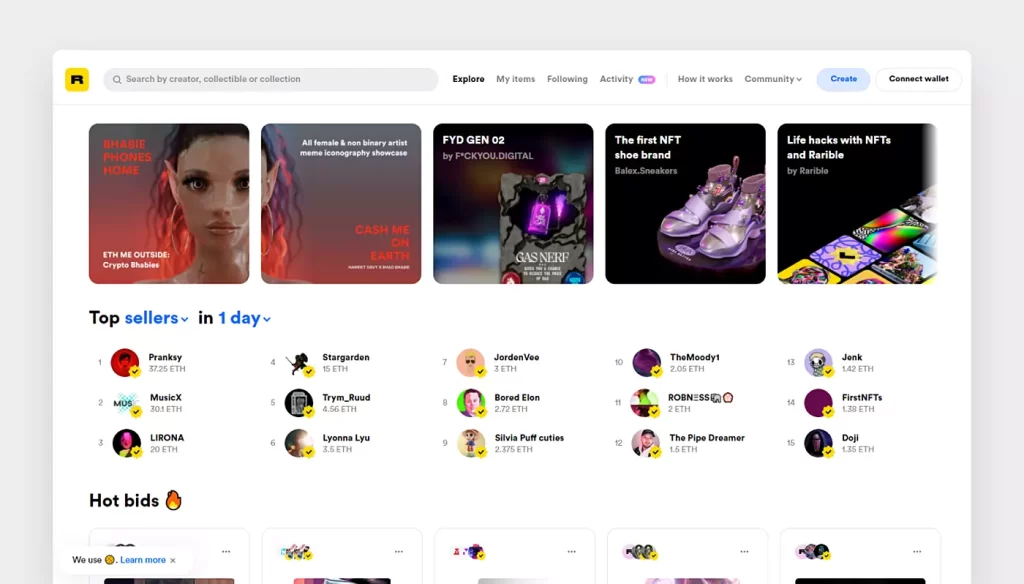
Rarible is a fully decentralized and community-owned trading platform where buyers and sellers can securely trade from a wide range of digital assets.
The platform rewards its exclusive token known as $RARI to creators and buyers for minting and buying digital art on their platform. This token enables voting power for their members to make any particular decision on the Rarible platform.
| Users | 20.06K |
| Volume | $8.06M |
| Transactions | 48.62K |
| Balance | $1.66K |
IV. Foundation
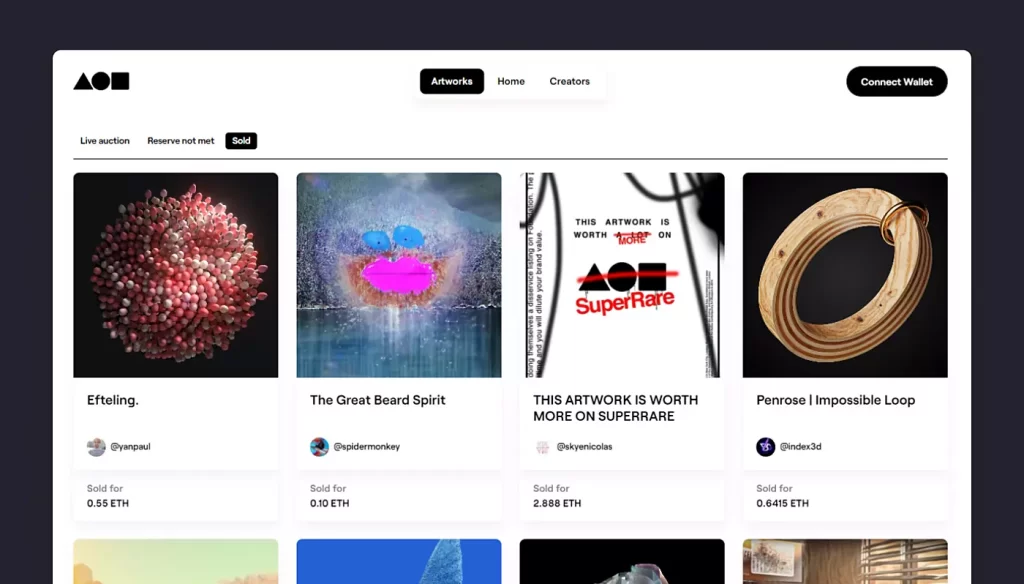
The platform foundation was built by the creator and artists to explore the blockchain possibilities behind the crypto. The platform offers a unique feature known as Drop, where anyone can launch a collection of upto 10,000 NFTs for the cost of minting a single NFT.
Also, the creators can create landing pages for their collections to attract and inform the audience about their digital assets.
| Users | 4.37K |
| Volume | $16.97M |
| Transactions | 14.74K |
| Balance | $396.94K |
V. Axie Marketplace
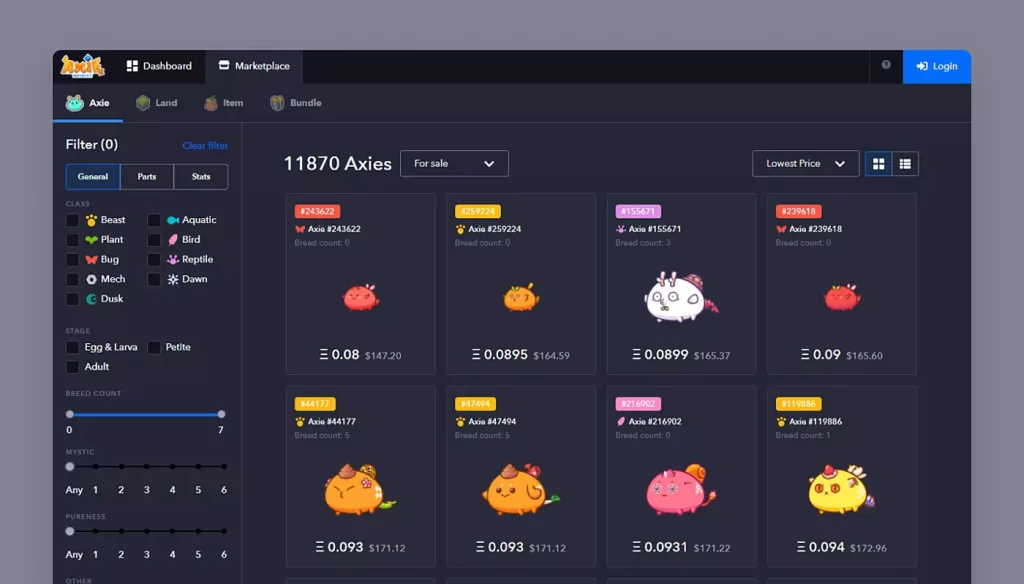
Axie Marketplace contains special characters known as Axies from the well-known game “Axie Infinity.” The trading platform has been built on the Ethereum blockchain, where anyone can create cartoon creatures for selling to the game’s community.
| Users | 2.35K |
| Volume | $1.37M |
| Transactions | 10.38K |
| Balance | $1.39M |
Also, you can check how to create your NFT on the Ethereum blockchain using Metamask wallet with the following steps:
How to create your NFTs?
Follow the steps to create your nonfungible token:
- Create your account on any crypto exchange to get your crypto wallet
- Connect your personal bank account to a crypto exchange for buying Ethereum
- Open any browser to access your Metamask wallet by signing up on that platform (allowing you to send Ethereum on the minting platform to pay as a gas fee)
- Visit any trading platform like OpenSea, Rarible, and other to mint your collections.
To create your nonfungible token trading platform, you must know some essential components required on every nonfungible token-selling platform.
Components of NFT Marketplace
If you are looking to create your trading platform, you must know the following important architecture component required for your platform:
1. Blockchain technology integration
You can use multiple blockchain networks such as public, private, and hybrid. Integrating blockchain technology will provide multiple benefits to your trading platform, enabling your marketplace to use cryptocurrencies and smart contracts.
Multiple best blockchain networks available you can use for your business, such as Ethereum, IBM blockchain, Solana, etc.
2. Minting
Minting is a process of tokenizing assets into a blockchain network. The process will enable users to mint their digital assets on your marketplace.
3. Token types
You must define the type of tokens your trading platform will support. For example, OpenSea supports a majority of digital assets, including ERC-721 and ERC-1155.
4. Navigation
Making your marketplace user-friendly should be your top priority. Therefore, implement good navigation practices in your nonfungible token trading platform to offer your users the best platform experience.
You should hire blockchain developers to create a nonfungible token trading platform that can help you create a platform that has straightforward navigation.
5. On-boarding
Help your app users quickly join your platform. You can add social media integration to ease up the process of onboarding so new app users can quickly join your trading platform.
For those who want to keep their social media details private. You can ask for some information such as user name and e-mail address.
6. Advanced filters
To help your users to find their favorite collections on your marketplace, you can add advanced search filters to your app, such as artist names, categories, top-rated, etc.
Adding advanced search filters to your trading platform will help your users quickly find their favorite collections relevant to their interests.
7. Effective listings
Effective information about each collection can increase the chance of having more sales on your platform. You can add multiple description sections to your marketplace, such as pricing, text box, rating box, etc.
Also, you can provide creators to submit videos and screenshots relating to their collection to make it attractive for nonfungible token buyers.
8. Secure access to a blockchain wallet
Protecting your user information on your trading platform is another important thing you must consider.
You can partner with blockchain developers to help you provide the best solution through which users can access their blockchain wallet on your platform without compromising their security and privacy.
9. Analytics (transparent price history)
Help your users to know the pricing history of their favorite collections by offering a clear price history of available collections on your platform.
Also, you can add other analytics-based features such as digital asset performance records, highest and lowest peak prices, etc.
10. Digital collections
With good digital collections, creating your marketplace makes sense. You can best partner with good creators to make them launch their collections on your trading platform.
Also, you can hire some digital artists to create exclusive collections on your platform that can help you attract large buyers and investors worldwide.
If you have decided to create your marketplace but need to know the exact steps. You can check how to create your trading platform.
Steps to start NFT marketplace development
To know how to create your trading platform, you can follow the given steps:
1. Analysis of business requirements
It is the first step where your software development partner will explore your project details. You should be clear with your project with these given points:
- What is your target audience to whom you will sell NFTs
- What blockchain technology do you wish to use for your trading platform?
- Analytical tools that you will use to track your marketplace performance
- What unique points will you add to your trading platform to make it stand out among your competitors?
- What token types will your platform support, such as ERC-721 or ERC-1155
2. Discovery stage
You must discover the design types and features you want to add to your trading platform. The discovery phase will include the following factors.
- User stories
- User Persona
- Information architecture
- User flows
- App wireframe
Try to maintain creating your UX strategy hand in hand with design discovery to let you create a long-term plan for your platform. Along with the discovery design phase, you must take care of technical aspects such as
- NFT marketplace architecture
- Data flow
- Back end development
- Third-party integrations
3. UX/UI Design
To help your user easily understand and navigate your trading platform, you must prioritize creating an effective UI design for your platform.
Partnering with the best app development company can help you create a user interface that can offer a great experience on your platform.
While creating your platform’s user interface, you must take care of UX wireframing, app prototyping, and UI mockups.
Also, take care of the following things:
- Can your app users easily navigate through your platform to buy and sell digital assets?
- Are there any challenges users can face while using your nonfungible trading platform?
4. NFT app platform development
After deciding on your marketplace’s technical and design description, the blockchain developers will start building your platform.
The platform development stage will include integrating your marketplace’s backend and front-end parts to make them fully functional through your platform user interface.
Your involvement in this stage is necessary to ensure you are getting your platform developed as per your expectation.
Ensure your platform has the following features:
- Feature to mint digital assets
- Support to many crypto wallets
- Easy onboarding
- Allowing users to bid NFTs
- Advanced search filters to help users to find specific collections
5. Quality assurance
To ensure your users will not face any technical glitches or find any drawbacks in your platform, perform quality testing multiple times until you are fully satisfied with the platform quality of your trading platform.
Quality testing will help you identify any drawbacks or areas of improvement in your trading platform so that you can make all the required changes and modifications to your platform.
While testing your app, check the following:
- Does your marketplace allow easy integration into crypto wallets?
- Do all the available buttons and UI elements work as per the details given on your NFT trading platform?
- Perform a dummy test where you will mint your digital collections and purchase them with other user accounts.
6. Project release
Once your NFT store is fully developed, you can decide how to launch them in your targeted market.
You can perform different marketing strategies to increase the chance of having more digital art creators and buyers on your platform.
Twitter is considered the best platform, with a large involvement of NFT buyers and creators. Post relevant tweets to the NFT marketplace to attract NFT investors and creators on your platform.
Also, it will be best for you to collect as much user feedback for improving your trading platform.
7. Post-release support
Now, your trading platform is live on your targeted platform. However, you may need to update your platform regularly by adding new features to eliminate any drawbacks from your trading platform.
- Do regular checks on your marketplace competitor to know what features your competitor has added to their NFT marketplace
- Based on your user feedback, modify your platform to offer the best experience for buying and selling nonfungible tokens
If you have partnered with blockchain developers, they can help you provide a regular update on your platform to ensure your app users are getting a better platform experience.
What features are essential for your NFT store? Check-in detail.
List of required NFT marketplace features
Here is the list of features you may need to add to your nonfungible token store:
1. Ranking
It is an algorithm that will decide which NFT collection is getting so much attention on your platform. All the collections will be ranked based on their search volume, price, the graph of behavior, and other factors.
Providing ranking on your platform will help users to find the best collections available on your platform.
2. Bundles
Help your creators to assemble all their annual collections into bundles so they can showcase their collections all at once.
3. Bidding
Allowing users to trade collections on your platform is one of the most essential features you need in your NFT trading platform. There are multiple types of bidding available that you can add to your platform, such as
I. Fixed-price listings
In this listing, the price remains unchanged. So be it anytime whenever users visit your platform, they will see the same price that they saw before for specific collections.
II. Sealed first-price auction listing
In this listing, all the bids are submitted simultaneously, where no bidders know the value offered by other participants. In such bidding, the one who placed the high bid gets the best deal.
III. Sealed second-price auction
This bidding practice is similar to the first-price auction. However, the winning bidder will pay the second high bid proposed differently from what they bid.
IV. Dutch auction listings
In this bidding, sellers can set start and end prices to specify the length of time they wish to sell a token..
V. English auction listings
English auction prices listing involves practices where sellers can set the minimum price for their listing and wait for bids. The bidding goes on until the seller finds an agreeable price for their bidding.
4. Filters
Helping your users quickly find their favorite collection can be one of the best plus points. You can add search filters with different parameters, such as new listings, pricing ranges, the highest last sale, etc.
Working with experienced blockchain developers will help you decide what filters should be added to your trading platform. Adding search filters will help users find collections on your platform that are relevant to their interests.
How to create NFT marketplace architecture?
Proper market research, competitor analysis, and studying the target audience is the first step to creating your non-fungible token trading platform.
However, developing your NFT store is a challenging task. You will need consultancy from blockchain developers to help you create your NFT trading platform on your desired network.
Hire blockchain developers to create an NFT marketplace
Due to the high demand and less availability of blockchain developers, finding excellent blockchain developers are hard to find.
To hire excellent blockchain developers for your project, you can contact Idea Usher. Our team offers a wide range of development services to help you easily build your platform on your preferred network.
Contact Idea Usher
Email:
Phone:
FAQ
1. How do I start building my NFT marketplace?
You can create your trading platform by following the given steps:
- Choose a blockchain architecture
- Decide between the open or closed nature of the market
- Create the user interface of your platform
- Decide the commission fee for your platform
- Join multiple communities to promote your digital asset trading platform
2. How does an NFT marketplace work?
The marketplace allows users to buy and sell non-fungible tokens. The store offers a wide range of collections and allows NFT creators to mint their digital assets.






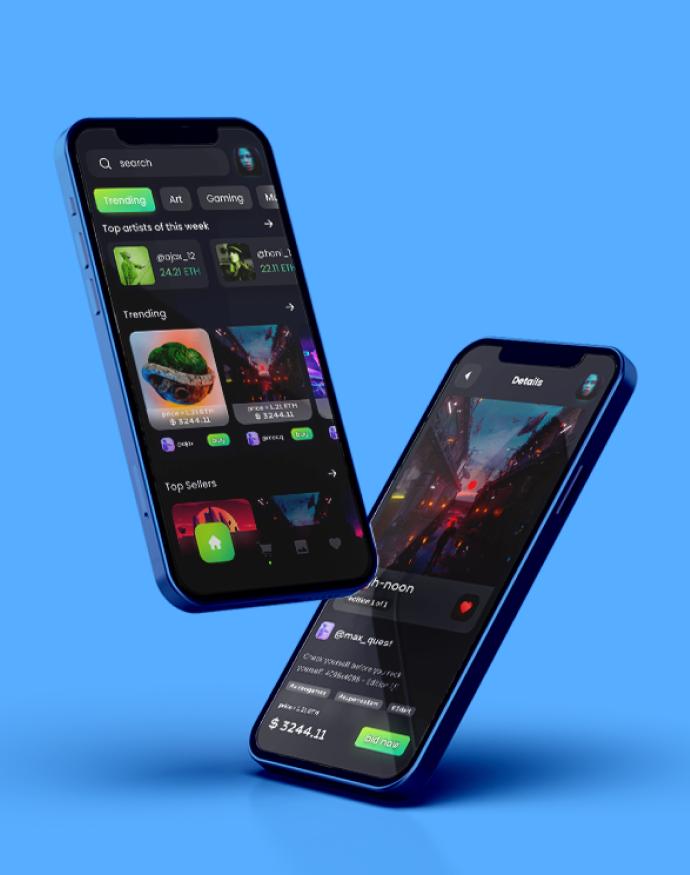


Gaurav Patil